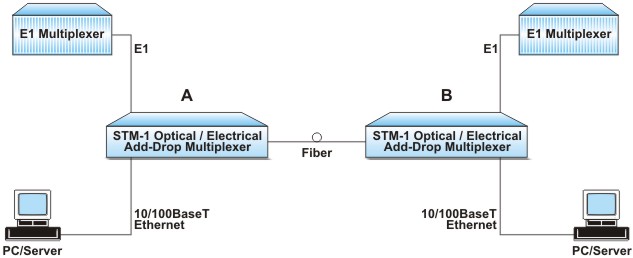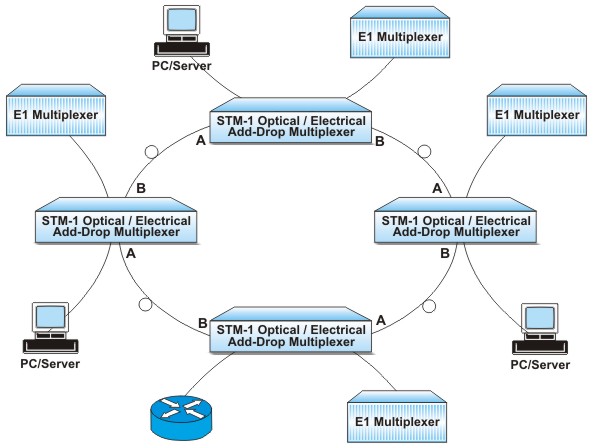STM-1, 63 E1 (Optical / Electrical) Add-Drop SDH Multiplexer
Description
Valiant's offers STM-1 63 E1 (Optical / Electrical), Add-Drop SDH Multiplexer unit is a modular platform unit with two 155.52Mbps optical / electrical interfaces, which may be used in a point-to-point, chain or ring application to provide an ultra-compact, cost effective and flexible multi-service platform.
63xE1 interfaces (120 Ohms [RJ-45] and 75 Ohms [BNC] options along with Engineering Order Wire is available. The user removable / replaceable STM-1 Optical / Electrical interface option makes it easy to meet various and changing user requirements. Orion's STM-1, SDH Transmission Equipment provides full capability to cross-connect at E1 level between all tributaries.

The equipment can be used as Terminal Multiplexer (TM) or an Add-Drop-Multiplexer (ADM) to build a point-to-point, ring and chain (add-drop) transmission network.
Related Links
Features and Highlights
- 1U height, 19-Inch standard rack-mountable chassis
- Service interfaces
- 2 x STM-1 optical interfaces, MSA compliant SFP (pluggable) optical module (LC connector) based design, which supports onsite optical port replacement
- 2 x STM-1 electrical interfaces, SFP electrical module (Mini BNC connector) Optional
- Maximum 16 E1 interfaces compliant with ITU-T G.703 (8 E1 interfaces per card)
- 120 Ohms E1 and 75 Ohms E1 interfaces options available.
- Provides complete diagnostics facilities to the user for monitoring optical ports and provide reading of optical transmit power, optical receive power, laser temperature, bias current in voltage alarms etc.
- Performance Monitoring and Alarms - Error counts for B1, B2, B3
- Performance Analysis - Error Seconds (ES), Several Error Seconds (SES), Unavailable seconds (UAS), Higher Order Virtual Container - Remote Error Indication (HOVC-REI), Higher Order Virtual Container - Pointer Justification Event (HOVC-PJE)
- Management and Maintenance interfaces
- 10/100BaseT Ethernet management interface
- RS232 serial management interface
- Remote (Telnet) management interface
- Windows XP based Graphical User Interface (GUI)
- Windows 7 based Graphical User Interface (GUI)
- SNMP V2 Monitoring
- Engineering Order Wire (EOW) interface (RJ-11)
- NMS (Network Management System) for monitoring multiple units from a single / central location
- Timing mode
- Synchronization with STM-1 line timing
- Synchronization with timing from any of the E1 interfaces (1-16 E1 tributary interfaces)
- External timing source option - 120 Ohms 2MBps (External Bits Clock)
- External timing source - 120 Ohms 2MHz (External TTL Clock) - Factory Configurable
- Internal Clock - ITU-T G.813 internal oscillator (Stratum 3)
- The timing source can be auto-switched according to default or operator programmed settings
- Supports 1+1 Line Protection and Automatic Protection Switching (APS) with less than 50ms recovery
- Supports point-to-point, ring and chain topology (4 VCG card only)
- Local management and network-based management via a unified platform
- Supports Remote Power Down Detection and Auto Laser Shutdown
- Supports STM-1 and E1 loop-back for troubleshooting
- 850nm multi-Mode, 1310nm Single Mode and 1550nm Single Mode optical interface options offered
- Easy to operate
- Redundant power supply card options AC+DC, DC+DC and AC+AC
- 110V AC - 240V AC (50/60 Hz) power options available
- -48V DC power option available
- Power consumption less than 20W.
Alarm and Indicator Monitoring
- Power Indicator
- Current Status (integrity and activity) Indicator
- Urgent Alarm Indicator
- Minor Alarm Indicator
- Optical Signal Loss Alarm Indicator
- Remote Device Power-down Indicator
- Auto Laser Shutdown (ALS) Indicator
- Engineering Order-Wire (EOW) Indicator
- Dry contact via 9-pin, D-type male connector
- Buzzer Alarm
- SNMP Diagnostic and Monitoring
Application Diagram
Application # 1: Point to Point Network Application Diagram

Application # 2: Chain Network Application Diagram

Application # 3: Ring Network Application Diagram

